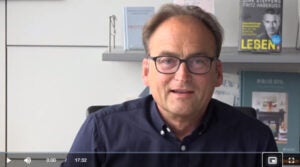Interview with Thomas Rathnow, CEO, Penguin Random House Verlagsgruppe
 “A new challenge lies in finding the right balance between keeping everybody safe while also fostering creativity and productivity as we have re-opened our offices and are thinking about new hybrid forms of working in the future.”
“A new challenge lies in finding the right balance between keeping everybody safe while also fostering creativity and productivity as we have re-opened our offices and are thinking about new hybrid forms of working in the future.”
What have been your biggest learnings from COVID-19?
The lessons the pandemic taught us have been manifold. The pandemic is having short-, mid- and long-term effects on almost every aspect of our lives in almost every country in the world. In many respects, I believe COVID-19 has highlighted, accelerated, and magnified trends and tendencies that were already visible before. But now they can no longer be downplayed or ignored. This concerns both the private and the public sphere, and extends from the very personal to the realms of education, economics, cultural life, and the way we choose to be governed politically on local, national, and international levels. For instance, we have witnessed that highly polarized countries run by populist governments have in general been less successful in managing the COVID-19 crisis. We have also been reminded how much the vitality and stability of a liberal democracy depends on having a media landscape that offers reliable, scientifically sound, and fact-based information and analyses to the public. This takes us to book publishing. I believe our experience during the ongoing crisis should strongly reinforce our belief in the importance of what we do. Our books, whether fiction or nonfiction, were sought after to a great degree. Whether they intend to inform, educate, spark debate, entertain, or give practical advice, readers worldwide turned to books because they enrich people’s lives in a profound way like no other medium. And despite various difficulties resulting from the crisis—such as store closings during lockdowns—the book business has proven to be resilient and capable of quickly adapting to new situations in order to provide readers with the books they want and need. To me, this experience is sound proof that our business is healthy at its core. But it also shows that it is now especially crucial to focus on further developing our capabilities regarding data and reach measures. In that sense, the COVID-19 crisis presents huge opportunities that we must act upon, starting now.
At the same time, I don’t want to omit the fact that many facets of our cultural life have been hit terribly hard by the pandemic. So many forms of art and cultural expression depend on people gathering physically. Music, theater, opera, dance, exhibitions, etc., have been severely hurt, and many artists and employees at various cultural institutions are losing their livelihoods. This is extremely worrying, especially as no one quite knows what a post-COVID world will look like. But, for better or for worse, I am convinced that we will never go back to the former normal. Though it’s too early for a conclusion, I would say that the pandemic has made us realize how fragile today’s world is, and how little we can take for granted. Many people have suffered, and the crisis has emphasized the negative effects of inequality, but it has also shown us the power of solidarity. And in terms of Penguin Random House, I believe it has presented us with challenges that we are uniquely equipped to handle successfully in shaping the book business of the future for the benefit of authors and readers alike.
What has inspired you during this time?
Over the last few months, three things have been most inspiring for me, personally.
Being able to witness that our audiences didn’t turn away from books. As much as we compete with other media offerings, especially in the digital realm, people cherish the experience of reading and they value the quality of our content. Having our sense of purpose reinforced in such a way is very gratifying.
I was happily surprised and inspired by the creativity and flexibility that the rather traditional German book industry showed in getting books to the readers in times of crisis.
The creative and dedicated way in which we at Penguin Random House, our people and teams at all levels of the organization, took on new challenges in a spirit of solidarity and responsibility. How we intensified our forms of cooperation and openly shared our experiences regarding the effects and challenges of COVID-19, on both a global and a local level, was more than inspiring: I believe this has had a very real and positive effect on the quality of our management of the crisis.
What are some challenges you, personally as CEO, and your local territory have been facing?
Our initial challenge was the same one people faced everywhere: shifting all our employees to work from home, providing the digital infrastructure necessary, and doing whatever we could to keep operations going. All in all, this worked remarkably well, I would say. It quickly became clear that our executives and managers needed to rethink the obligations of leadership and be ever more focused on closely communicating with our teams throughout the organization.
Another early challenge was executing the right measures in reacting to the effects of COVID-19 with regard to the economic situation of our company. This concerned not only the well-being of our publishing imprints—we were careful to also take our authors’ and the booksellers’ situations into account as well.
Now a new challenge lies in finding the right balance between keeping everybody safe and also fostering creativity and productivity as we have reopened our offices and are thinking about new hybrid forms of working in the future.
Beyond these very immediate reactions to the crisis, it quickly became clear that we needed to accelerate our ongoing efforts regarding our data capabilities in order to better understand consumer behavior and to more effectively target specific audiences for our books. One of my major objectives is to vigorously drive our change toward being a more data-based and end-consumer-oriented organization while preserving and in fact strengthening those virtues of traditional publishing that ensure that we attract the best talent, that we acquire the most relevant content, and that we publish the most meaningful books across all categories. This will always have to be at the heart of what we do.

